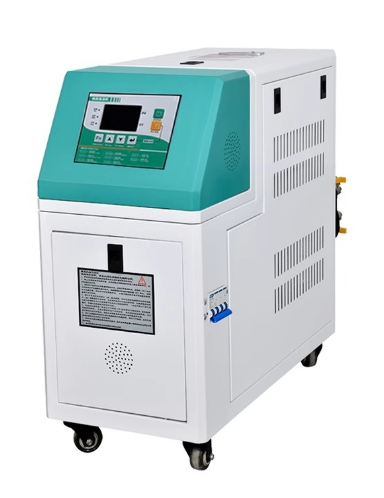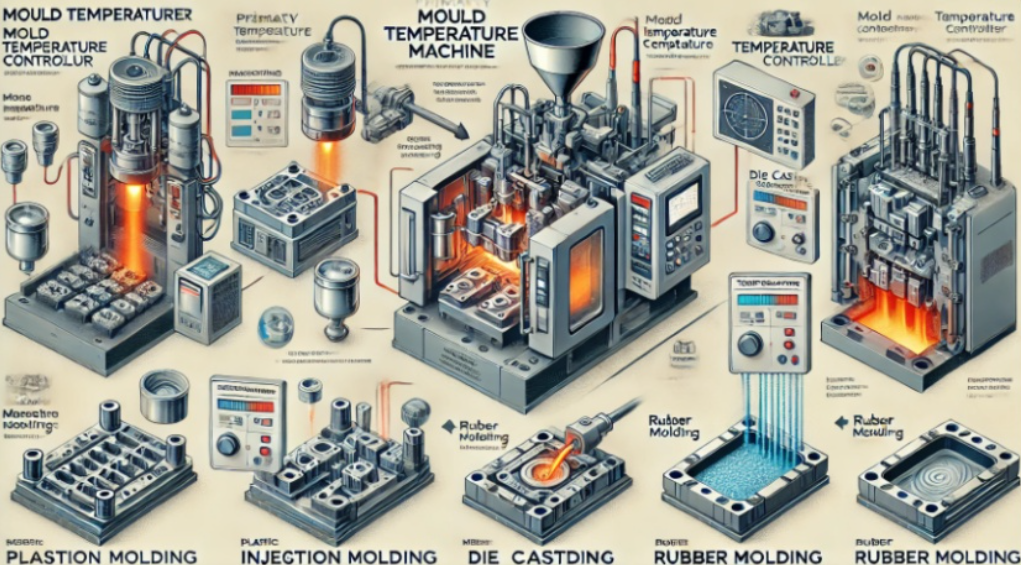In industrial manufacturing, especially in processes like injection molding, the need for precision and quality is paramount. One crucial factor influencing the final product's quality is the mold temperature. Controlling this aspect effectively requires specialized equipment such as a mould temperature machine. This machine ensures that the temperature of molds stays within the ideal range, improving the appearance, durability, and structural integrity of products.

A mould temperature machine, often referred to as a mold temperature controller, is designed to regulate and maintain the mold's temperature during industrial processes. Comprising a heating system, cooling system, power circulation system, and temperature control unit, this machine enables precise control over the mold's temperature by circulating a heat-conducting medium like water or oil. Here’s a closer look at each system’s role in achieving consistent mold temperatures:
Heating System: Responsible for raising the temperature of the medium to the desired level.
Cooling System: Lowers the temperature when necessary to prevent overheating.
Power Circulation System: Ensures the medium flows evenly between the machine and the mold.
Temperature Control System: Adjusts and monitors the temperature, keeping it within the preset range for optimal performance.
By maintaining the desired temperature, a mould temperature machine enhances production efficiency, reduces cycle time, and ultimately improves the quality of the end products.
Mold temperature plays a critical role in the quality and characteristics of products, particularly in high-temperature injection molding plastics. Whether working with materials like PVC, ABS, or PC, achieving the correct temperature can mean the difference between a high-quality, defect-free product and one that may need further processing or, worse, reworking. Here are some benefits of maintaining optimal mold temperature:
Improved Surface Quality: For injection molding, the right temperature ensures that plastic flows smoothly into the mold, creating a smoother surface finish and reducing imperfections.
Stress Reduction: Proper mold temperature control helps in minimizing internal stresses, which can prevent issues like warping, deformation, and cracking.
Enhanced Durability: A consistent mold temperature results in stronger bonds between the molecules of the molded material, increasing its durability and longevity.
Dimensional Accuracy: The appropriate temperature aids in maintaining precise dimensions, a critical aspect in industries like electronics, automotive, and aerospace.
Mold temperature controllers are widely used in various fields that require temperature precision, including:
Injection Molding: Ensuring a stable injection molding temperature can significantly influence the finish and accuracy of plastic products.
Die Casting: Temperature control in die casting is essential for creating dense, defect-free metal components.
Rubber Molding: Rubber products rely on precise temperature management to ensure flexibility and consistency.

In these applications, the mould temperature machine becomes an indispensable tool, enhancing process stability and product quality.
Controlling mold temperature involves several steps and considerations. Here’s a breakdown of the key factors that manufacturers should keep in mind:
Setting the Desired Temperature: The first step is to determine the ideal mold temperature based on the material being used. For instance, PVC injection molding temperature requirements differ from those of ABS or PC materials.
Selecting the Medium (Water or Oil): The heat-conducting medium significantly impacts temperature stability. Water is suitable for temperatures up to around 180°F, while oil is used for applications requiring higher temperatures.
Monitoring and Adjusting Temperature Continuously: A quality mould temperature machine is equipped with a temperature control system that continuously monitors and adjusts the temperature. This feature ensures the process stays within specified limits.
Maintaining Proper Circulation: The power circulation system keeps the heat-conducting medium flowing uniformly, preventing hotspots and temperature fluctuations that could affect the mold’s consistency.
When selecting a mold temperature controller, consider the specific requirements of your process and material. Here are some features to look for:
Temperature Range: The machine should cover the temperature range needed for your materials. For example, ABS melt temperature injection molding requires high temperatures, so an oil-based system might be more appropriate.
Heating and Cooling Efficiency: Look for a machine that offers quick heating and cooling capabilities to minimize cycle times.
Precision in Temperature Control: A high-quality temperature controller offers precise control with minimal deviation, ensuring consistent results.
Durability and Reliability: Machines with high-grade components and robust construction are ideal for handling long production cycles and high demands.
In injection molding temperature control, a mould temperature machine offers considerable advantages:
Reduces Defects and Improves Aesthetics: Consistent mold temperature contributes to smoother surfaces and reduces the risk of cosmetic defects like sink marks or weld lines.
Shortens Cycle Time: By maintaining optimal temperatures, the cooling and solidification processes happen faster, thereby reducing cycle time and boosting production speed.
Ensures Product Consistency: With controlled mold temperatures, each cycle produces consistent results, which is critical in large-scale manufacturing.
Controlling the temperature for different materials requires understanding each material's unique characteristics:
PC Injection Molding Temperature: Polycarbonate (PC) requires high temperatures for effective molding. Maintaining a steady temperature is essential for producing clear, high-quality components.
ABS Injection Molding: ABS needs consistent temperature control to avoid defects such as warping and cracking.
PVC Molding Temperature: PVC has different temperature requirements and is sensitive to overheating, which can cause degradation. A high-precision temperature controller helps avoid this issue by providing accurate monitoring and adjustment.
In summary, choosing the right mould temperature machine tailored to your specific material and production needs is essential for achieving the best results in injection molding and other precision-driven processes. Whether you're working with ABS, PVC, or PC, the right temperature control will improve product quality, reduce cycle times, and enhance durability. With the right equipment and temperature management, manufacturers can meet industry demands with high-quality, defect-free products.Qindao Machinery is a manufacturer specializing in the production of mold temperature controllers. If you have any product needs, we will use the most professional technology to solve them for you. You can send your purchasing questions to our mailbox 2314609053@qq.com